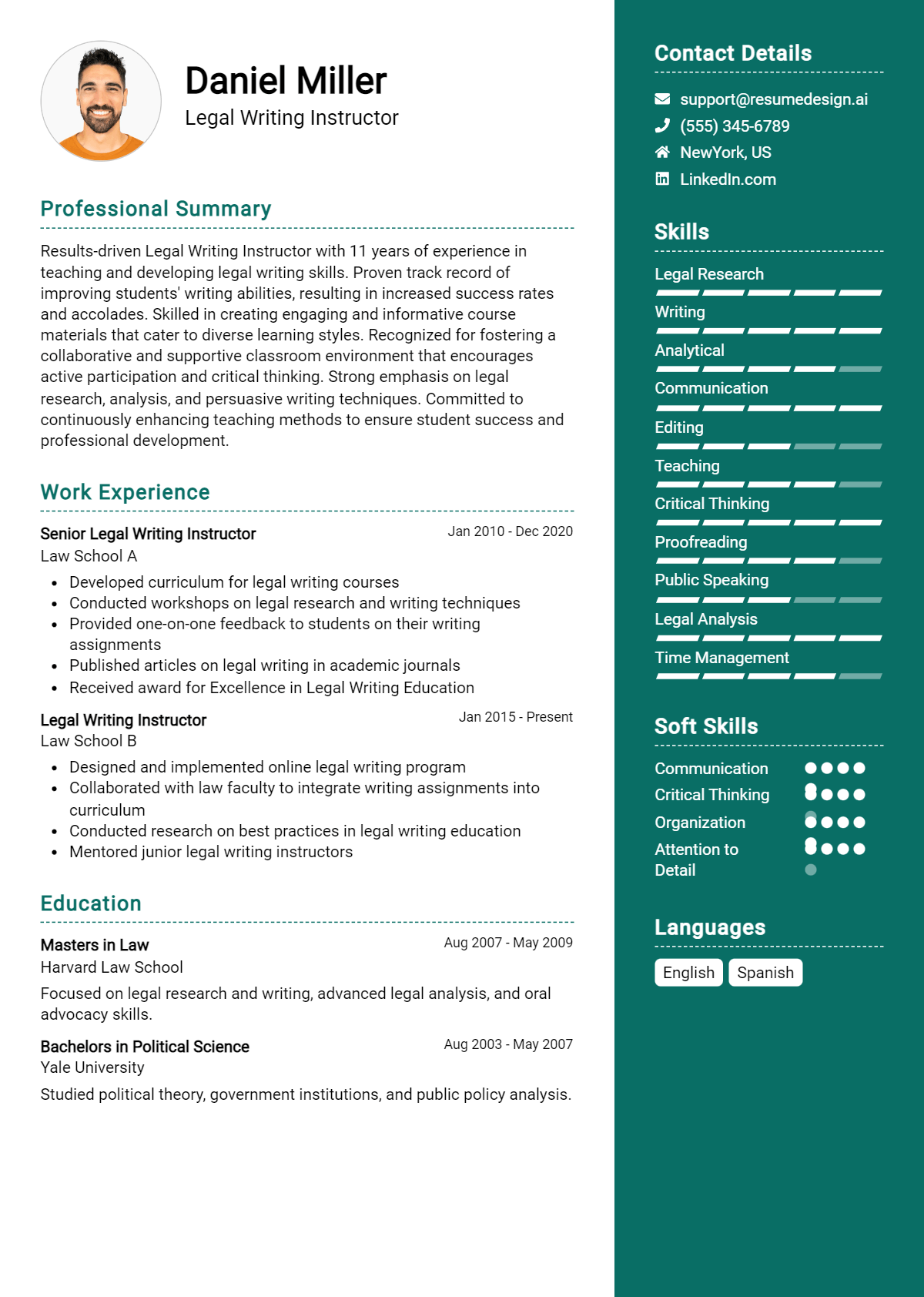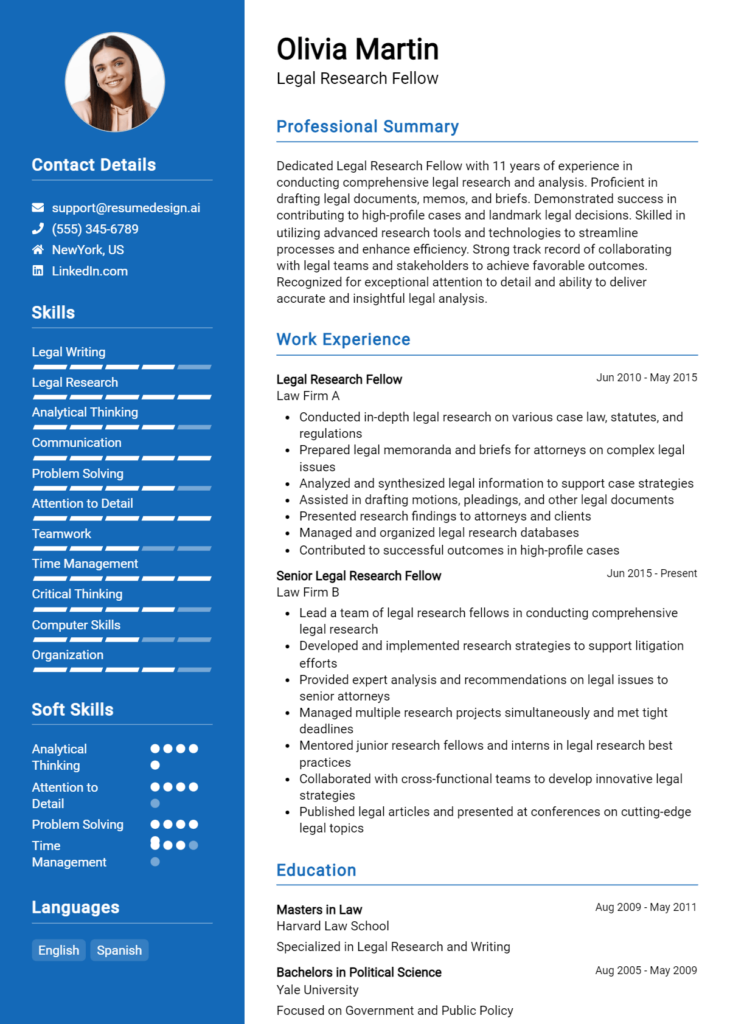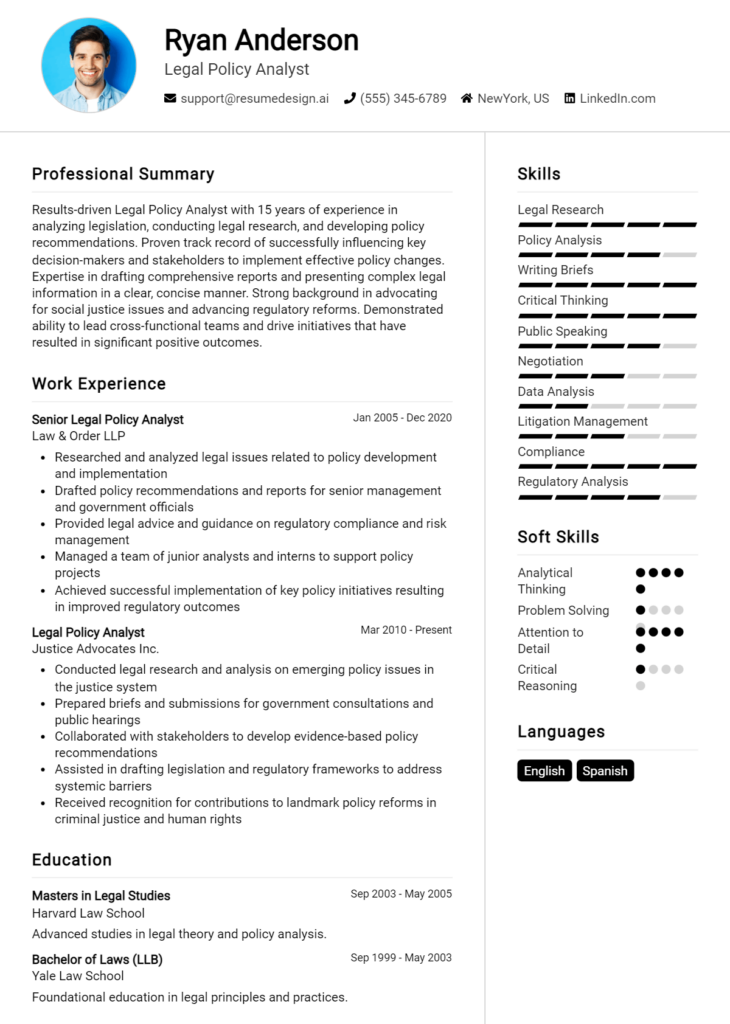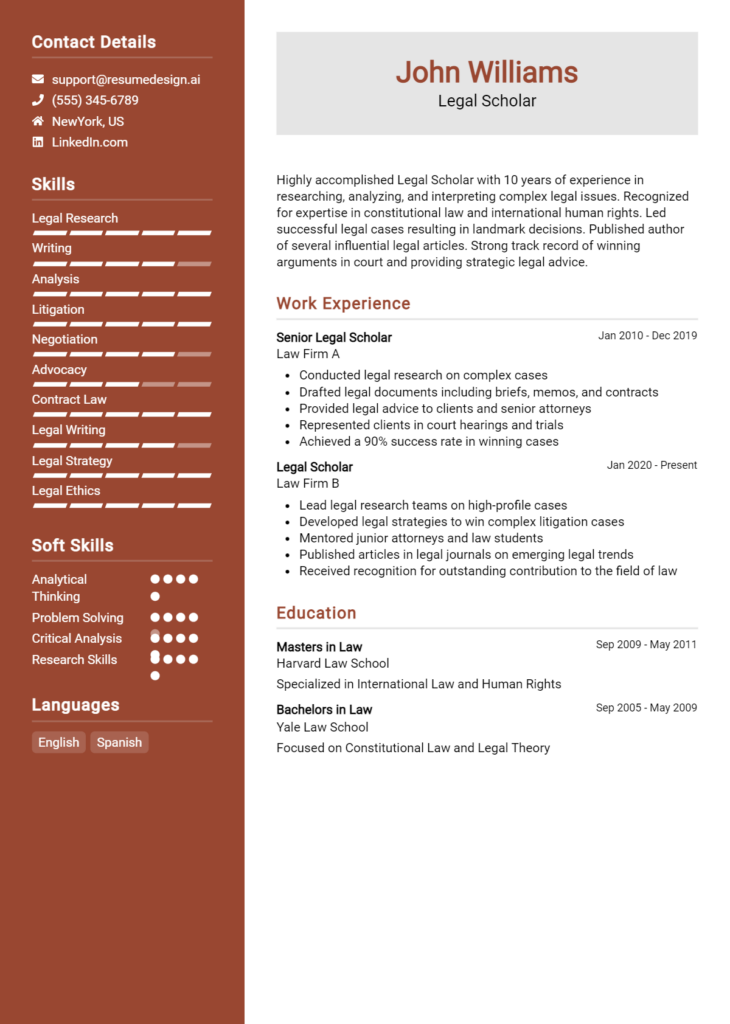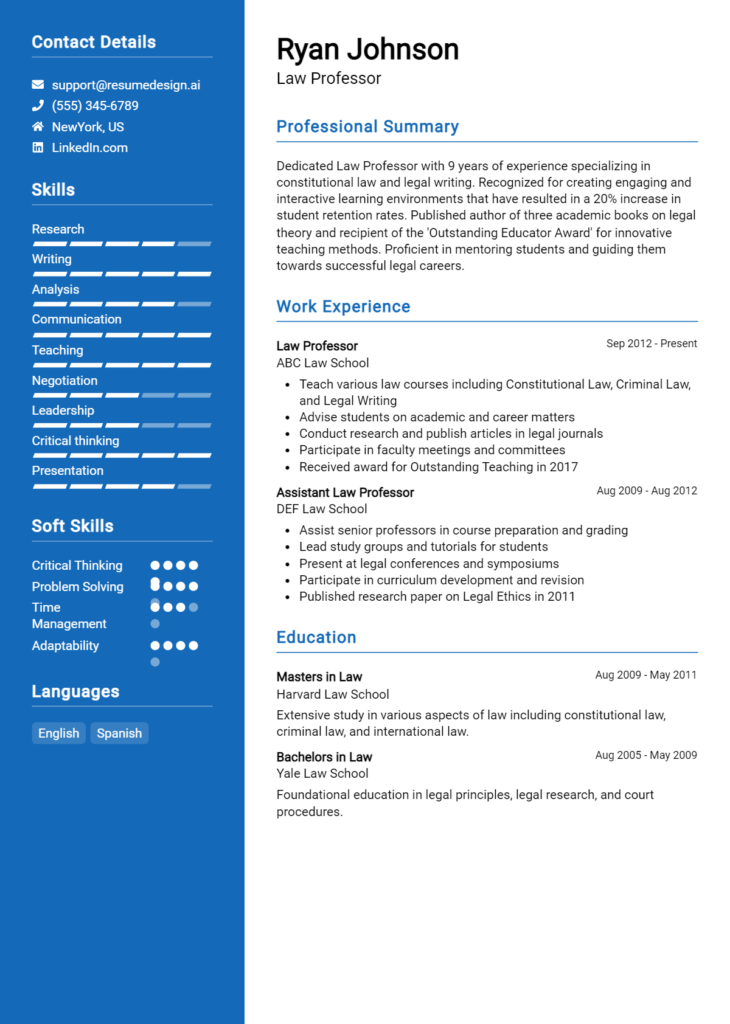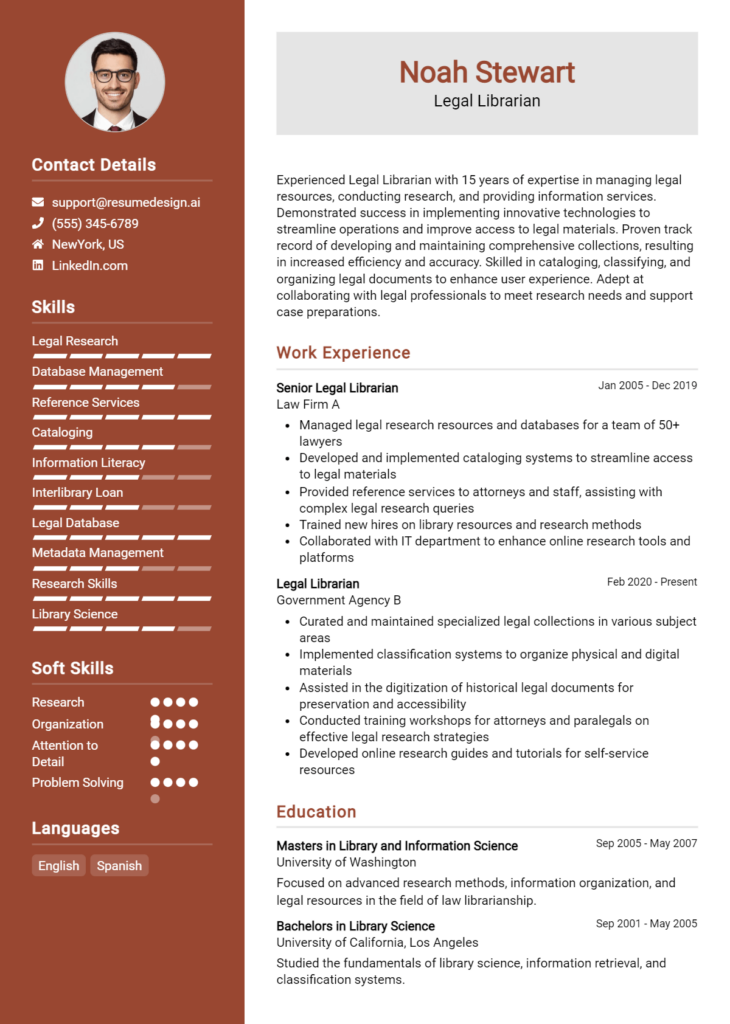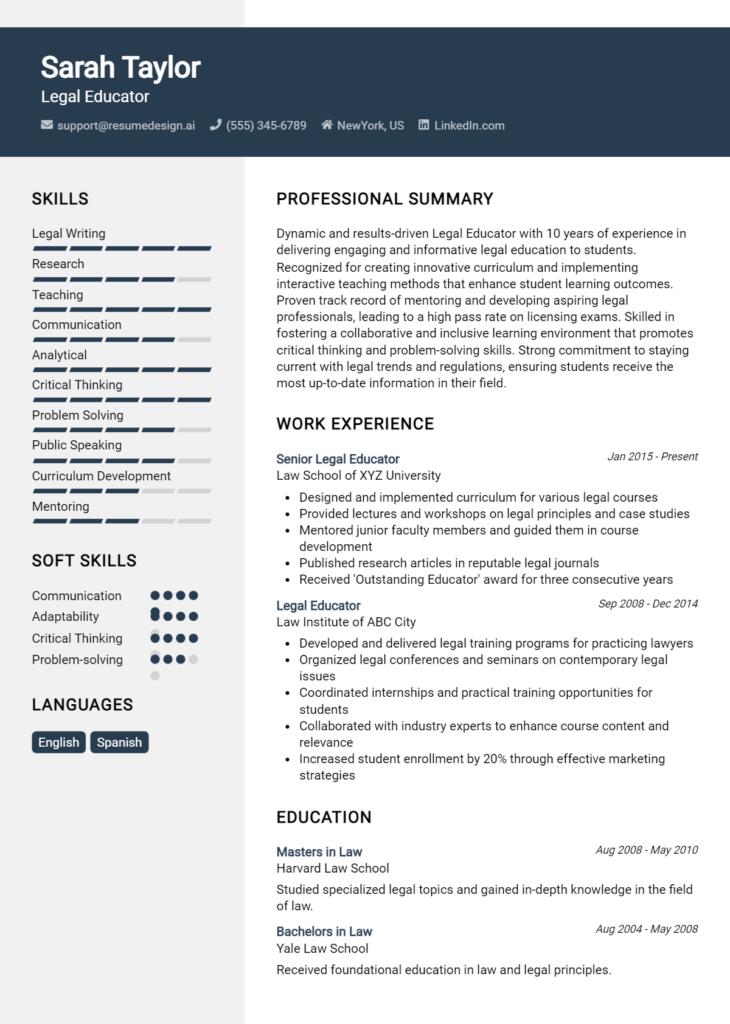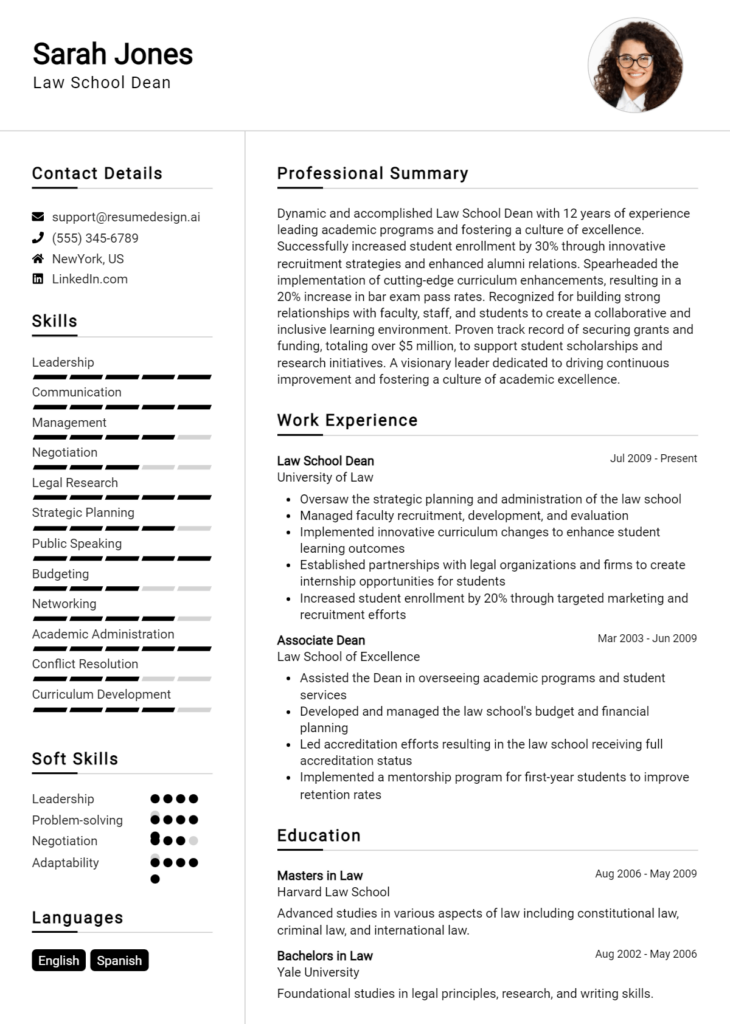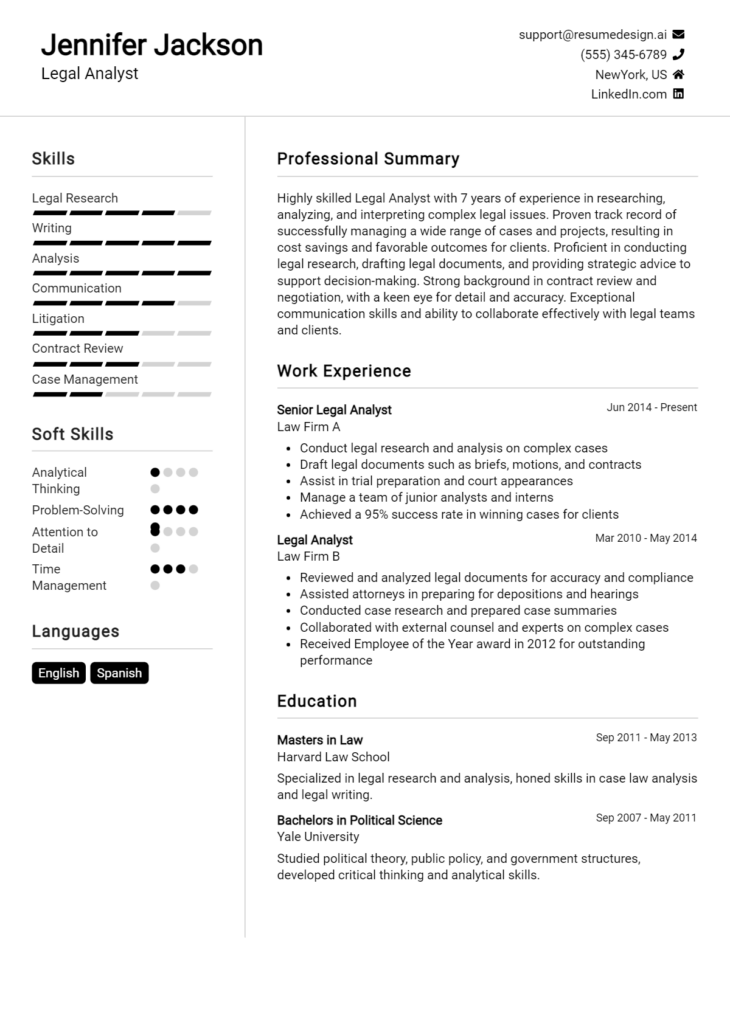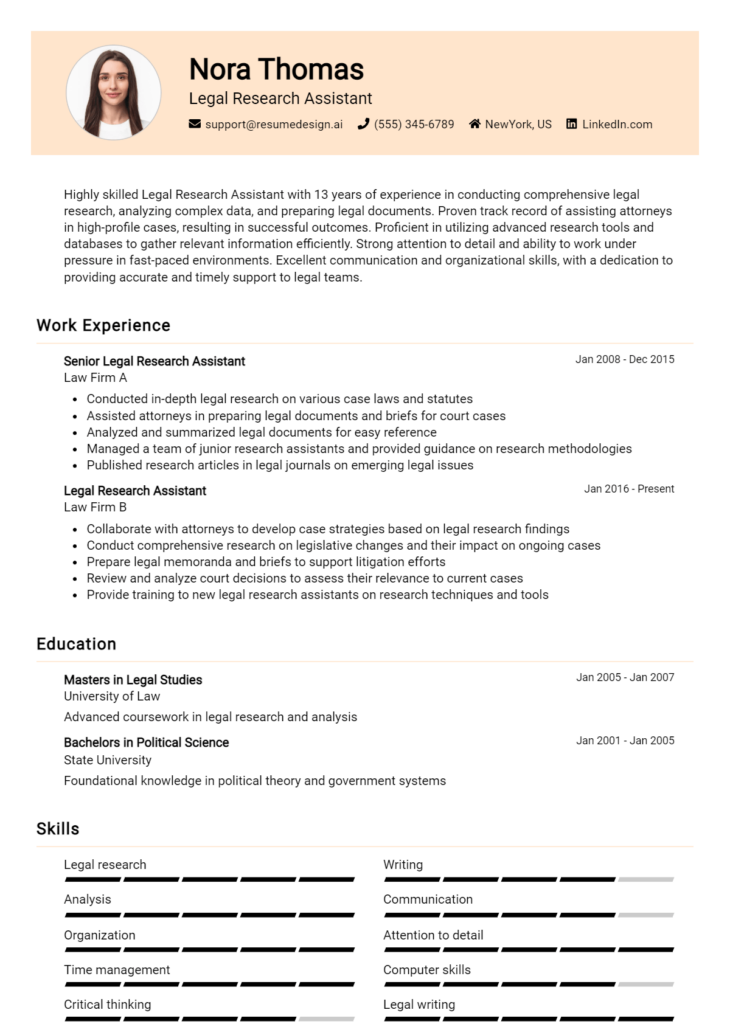Legal Writing Instructor Core Responsibilities
A Legal Writing Instructor is responsible for teaching students the art of legal writing, emphasizing clarity, precision, and persuasive techniques. This role requires exceptional technical skills in legal research, operational knowledge of legal principles, and strong problem-solving abilities to effectively bridge the gap between legal theory and practice. By fostering these competencies, the instructor contributes significantly to the organization's educational goals. A well-structured resume highlighting these skills can effectively demonstrate a candidate's qualifications and readiness for the role.
Common Responsibilities Listed on Legal Writing Instructor Resume
- Develop and deliver engaging legal writing curricula and lesson plans.
- Assess and provide constructive feedback on student writing assignments.
- Conduct workshops and seminars on legal research and writing techniques.
- Collaborate with faculty across departments to enhance interdisciplinary learning.
- Advise students on academic and career paths in the legal field.
- Stay updated on current legal trends and writing standards.
- Facilitate peer review sessions to improve students' editing skills.
- Encourage critical thinking and analytical skills through writing exercises.
- Organize guest lectures and networking events with legal professionals.
- Monitor student progress and implement tailored instructional strategies.
- Contribute to departmental meetings and curriculum development initiatives.
High-Level Resume Tips for Legal Writing Instructor Professionals
In the competitive field of legal education, a well-crafted resume serves as a crucial gateway to securing a position as a Legal Writing Instructor. This document is often the first impression a potential employer will have of a candidate, making it essential for the resume to effectively reflect both the skills and achievements relevant to the role. A strong resume not only showcases an applicant's expertise in legal writing but also underscores their teaching abilities and contributions to the field. In this guide, we will provide practical and actionable resume tips specifically tailored for Legal Writing Instructor professionals, ensuring your application stands out from the crowd.
Top Resume Tips for Legal Writing Instructor Professionals
- Tailor your resume to match the job description, emphasizing skills and experiences that align with the specific requirements of the position.
- Showcase relevant teaching experience, including courses taught, curriculum developed, and any innovative teaching methods employed.
- Quantify your achievements where possible, such as improvements in student performance, course evaluations, or successful program completions.
- Highlight industry-specific skills such as legal research, analysis, and writing proficiency to demonstrate your qualifications as a Legal Writing Instructor.
- Include any publications or presentations that showcase your expertise in legal writing and education, emphasizing your commitment to the field.
- Utilize action verbs to convey your contributions effectively, making your accomplishments sound dynamic and impactful.
- Incorporate keywords from the job listing to pass through Applicant Tracking Systems (ATS) and to make your resume more appealing to hiring committees.
- Keep your resume concise, ideally one page, ensuring that each section is relevant and clearly demonstrates your capabilities.
- Consider adding a summary statement at the beginning of your resume that encapsulates your qualifications and teaching philosophy.
By implementing these tips, you can significantly enhance your chances of landing a job in the Legal Writing Instructor field. A meticulously crafted resume that highlights your relevant skills and achievements not only positions you as a strong candidate but also demonstrates your professionalism and commitment to excellence in legal education.
Why Resume Headlines & Titles are Important for Legal Writing Instructor
In the competitive field of legal education, a well-crafted resume headline or title is essential for a Legal Writing Instructor. This brief yet impactful phrase serves as the first impression for hiring managers, summarizing a candidate's key qualifications and expertise in a single glance. A strong headline not only captures attention but also sets the tone for the entire resume, making it crucial to ensure that it is concise, relevant, and directly aligned with the job being applied for. By effectively conveying core competencies and areas of specialization, an instructor can present themselves as a strong contender in a crowded applicant pool.
Best Practices for Crafting Resume Headlines for Legal Writing Instructor
- Keep it concise: Aim for a headline that is no longer than one or two lines.
- Be role-specific: Use terminology that directly relates to the position of Legal Writing Instructor.
- Highlight your strengths: Incorporate key skills or accomplishments that set you apart.
- Use action-oriented language: Start with powerful verbs to convey dynamism and proactivity.
- Avoid jargon: Ensure the language is clear and accessible to all readers, including HR professionals.
- Tailor it for each application: Customize your headline to reflect the specific requirements of the job listing.
- Include relevant credentials: If applicable, mention degrees or certifications that enhance your qualifications.
- Make it impactful: Choose words that evoke a strong sense of expertise and professionalism.
Example Resume Headlines for Legal Writing Instructor
Strong Resume Headlines
Expert Legal Writing Instructor with 10+ Years of Experience in Law School Curriculum Development
Dedicated Legal Writing Educator Specializing in Advanced Research and Writing Techniques
Results-Driven Legal Writing Instructor with Proven Track Record of Student Success and Engagement
Innovative Legal Writing Specialist with a Focus on Practical Application in Legal Analysis
Weak Resume Headlines
Legal Writing Instructor Looking for Opportunities
Experienced Teacher in Law
Professional with Writing Skills
The strong resume headlines are effective because they succinctly convey the candidate's qualifications, experience, and focus areas, making them immediately relevant to the hiring manager. They utilize specific language that resonates with the job description and highlight the candidate's unique strengths. In contrast, the weak headlines fail to impress because they are vague and generic, lacking any specific details that would entice a hiring manager to learn more about the candidate. This lack of specificity can lead to missed opportunities, as they do not clearly communicate the candidate's value proposition or expertise in legal writing.
Writing an Exceptional Legal Writing Instructor Resume Summary
A well-crafted resume summary is essential for a Legal Writing Instructor as it serves as a powerful introduction to a candidate's qualifications. This brief overview allows hiring managers to quickly assess a candidate’s key skills, relevant experience, and notable accomplishments, making it a critical component of the resume. A strong summary should be concise and impactful, tailored specifically to the job being applied for, ensuring that the candidate stands out in a competitive field. By effectively summarizing qualifications, candidates can capture the attention of hiring professionals and increase their chances of landing an interview.
Best Practices for Writing a Legal Writing Instructor Resume Summary
- Quantify achievements: Use numbers or percentages to demonstrate your impact, such as improved student performance or successful publishing rates.
- Focus on skills: Highlight specific skills pertinent to legal writing, such as analytical reasoning, research proficiency, or editing expertise.
- Tailor the summary: Align your summary with the job description to ensure relevance and highlight your fit for the role.
- Be concise: Aim for 2-4 sentences that deliver maximum information without unnecessary detail.
- Use active language: Start sentences with strong action verbs to convey confidence and capability.
- Highlight unique qualifications: Mention any specialized training or certifications related to legal writing or education.
- Showcase teaching effectiveness: Include results from student evaluations or other indicators of teaching success.
- Maintain professionalism: Use formal language appropriate for an academic and legal environment.
Example Legal Writing Instructor Resume Summaries
Strong Resume Summaries
Dynamic Legal Writing Instructor with over 10 years of experience in academia, recognized for improving student writing skills by 30% through innovative teaching methodologies and personalized feedback.
Accomplished legal educator with a proven track record of publishing 15 articles in peer-reviewed journals, and mentoring students to secure internships in prestigious law firms, enhancing their professional development opportunities.
Results-oriented Legal Writing Instructor with expertise in curriculum development, leading to a 40% increase in student engagement scores and consistently receiving top evaluations from students for teaching effectiveness.
Weak Resume Summaries
Experienced instructor looking for a position to help students with legal writing.
I have taught legal writing for some time and want to continue in a similar role.
The examples of strong resume summaries are considered effective due to their specificity, quantifiable results, and direct relevance to the job of a Legal Writing Instructor. They highlight concrete accomplishments and skills that demonstrate the candidate's potential impact on the institution. Conversely, the weak resume summaries lack detail, fail to quantify achievements, and appear generic, making it difficult for hiring managers to gauge the candidates’ qualifications and suitability for the role.
Work Experience Section for Legal Writing Instructor Resume
The work experience section of a Legal Writing Instructor resume is crucial in demonstrating the candidate's technical skills, leadership abilities, and aptitude for delivering high-quality educational products. This section not only highlights relevant legal writing experience but also showcases the instructor's capacity to manage teams effectively and produce measurable outcomes in student performance and curriculum development. Quantifying achievements and aligning past experiences with industry standards enhances the candidate's profile, making them more appealing to potential employers.
Best Practices for Legal Writing Instructor Work Experience
- Focus on relevant legal writing and teaching experiences that align with the job description.
- Quantify your achievements with specific metrics, such as improved student success rates or curriculum development timelines.
- Highlight technical expertise in legal research, writing, and citation styles.
- Emphasize your ability to collaborate with colleagues and legal professionals.
- Include examples of leadership in team projects or mentorship roles.
- Demonstrate innovation in teaching methodologies or course design.
- Use clear, concise language to articulate your contributions and impact.
- Tailor your work experience to reflect the competencies most sought after in legal writing instruction.
Example Work Experiences for Legal Writing Instructor
Strong Experiences
- Developed and implemented a new legal writing curriculum that increased student assessment scores by 30% over two academic years.
- Led a team of 5 instructors in a collaborative project to redesign the legal writing program, resulting in a 25% increase in student retention rates.
- Conducted workshops on advanced legal research techniques, which improved student performance in legal writing assignments by 40%.
- Mentored junior faculty in best practices for legal writing instruction, enhancing overall teaching effectiveness as evidenced by improved student evaluations.
Weak Experiences
- Taught legal writing classes for a few semesters.
- Worked with other instructors on course development.
- Participated in workshops about legal writing.
- Helped students with their writing assignments.
The examples provided demonstrate a clear distinction between strong and weak experiences. Strong experiences are characterized by specific, quantifiable outcomes and leadership roles that illustrate the candidate's contributions and effectiveness. In contrast, weak experiences lack detail, specificity, and measurable impact, making them less persuasive and failing to convey the candidate's true capabilities as a legal writing instructor.
Education and Certifications Section for Legal Writing Instructor Resume
The education and certifications section of a Legal Writing Instructor resume plays a crucial role in demonstrating the candidate's academic qualifications, industry-relevant credentials, and commitment to continuous professional development. This section serves to highlight not only the foundational knowledge acquired through formal education but also any specialized training and certifications that enhance the candidate's expertise in legal writing. By including relevant coursework and advanced credentials, candidates can significantly boost their credibility and showcase their alignment with the specific demands of the job role, making them more attractive to potential employers.
Best Practices for Legal Writing Instructor Education and Certifications
- Include only relevant degrees and certifications that pertain to legal writing or education.
- Provide details about specific coursework that enhances your qualifications for the role.
- Highlight advanced degrees (e.g., JD, LLM) or specialized certifications (e.g., Certified Legal Writing Specialist).
- List any ongoing professional development courses or workshops related to legal writing.
- Use clear formatting to differentiate between degrees, certifications, and relevant coursework.
- Emphasize any honors or distinctions received during your educational journey.
- Consider including affiliations with professional organizations that enhance credibility.
- Keep the section concise but informative, ensuring easy readability for hiring managers.
Example Education and Certifications for Legal Writing Instructor
Strong Examples
- Juris Doctor (JD), University of California, Berkeley School of Law
- Master of Legal Studies (MLS), Arizona State University, College of Law
- Certification in Legal Writing and Research, National Association of Legal Professionals
- Relevant Coursework: Advanced Legal Writing, Legal Research Methodologies, and Persuasive Writing Techniques
Weak Examples
- Bachelor of Arts in English Literature, State University (not relevant to legal writing)
- Basic Computer Skills Certification (not applicable to legal writing)
- High School Diploma, Local High School (not sufficient for the role)
- Certification in Creative Writing (not aligned with legal writing instruction)
The strong examples are considered robust because they directly relate to the qualifications and skills necessary for a Legal Writing Instructor, showcasing advanced degrees and certifications that enhance credibility in the field. In contrast, the weak examples highlight educational qualifications that are either outdated, irrelevant, or insufficiently advanced to meet the demands of a legal writing teaching role, thereby detracting from the candidate's overall appeal and suitability for the position.
Top Skills & Keywords for Legal Writing Instructor Resume
As a Legal Writing Instructor, possessing the right skills is paramount to effectively guide students in mastering the intricate nuances of legal writing. A well-crafted resume that highlights both hard and soft skills can significantly enhance a candidate's appeal to potential employers. Hard skills demonstrate a candidate’s technical proficiency and specific legal knowledge, while soft skills showcase their ability to communicate, collaborate, and inspire students. Together, these skills create a comprehensive profile that reflects the qualifications necessary for success in this vital educational role.
Top Hard & Soft Skills for Legal Writing Instructor
Soft Skills
- Excellent communication skills
- Strong organizational abilities
- Adaptability and flexibility
- Critical thinking and analytical skills
- Empathy and emotional intelligence
- Conflict resolution
- Leadership and mentorship
- Attention to detail
- Time management
- Collaborative spirit
Hard Skills
- Proficiency in legal research techniques
- Familiarity with citation styles (e.g., Bluebook, ALWD)
- Understanding of various legal writing formats (e.g., memos, briefs)
- Knowledge of substantive areas of law
- Experience in curriculum development
- Ability to use legal writing software and tools
- Strong editing and proofreading skills
- Competence in teaching methodology
- Familiarity with legal ethics and professional responsibility
- Experience with online teaching platforms
By integrating these essential skills into a resume, candidates can effectively demonstrate their readiness for the role of Legal Writing Instructor, complementing their work experience with the right attributes that educational institutions seek.
Stand Out with a Winning Legal Writing Instructor Cover Letter
I am writing to express my interest in the Legal Writing Instructor position at [Institution Name], as advertised on [where you found the job listing]. With a strong academic background in law and a passion for teaching, I am excited about the opportunity to contribute to the development of future legal professionals. My experience in both legal practice and academia has equipped me with the skills necessary to guide students in mastering the art of legal writing, a critical component of their legal education.
During my time as a legal writing tutor at [Previous Institution/Organization], I developed and implemented a comprehensive curriculum that focused on the essential elements of legal analysis, research, and writing. I emphasized the importance of clarity and precision in legal documents, helping students to cultivate their unique voices while adhering to the conventions of legal writing. Through workshops, individualized feedback, and collaborative peer reviews, I fostered an engaging and supportive learning environment that encouraged students to take risks and grow as writers.
In addition to my teaching experience, I have published several articles in reputable legal journals, which not only reflects my commitment to the field but also enhances my ability to provide students with real-world insights into legal writing practices. I am confident that my expertise in legal research and analysis, along with my innovative teaching methods, will inspire and empower students to excel in their writing abilities and succeed in their legal careers. I look forward to the possibility of contributing to [Institution Name] and helping shape the next generation of legal scholars and practitioners.
Thank you for considering my application. I am eager to discuss how my background, skills, and enthusiasms align with the goals of your program. I hope to bring my dedication to legal writing education to [Institution Name] and contribute positively to your academic community.
Common Mistakes to Avoid in a Legal Writing Instructor Resume
When crafting a resume for a Legal Writing Instructor position, it's essential to present your qualifications and experience effectively. Many applicants make common mistakes that can undermine their chances of standing out in a competitive job market. Understanding these pitfalls can help you create a compelling resume that showcases your skills in legal writing and instruction. Here are some frequent errors to avoid:
Vague Objective Statements: Instead of a generic objective, use a specific statement that highlights your goals and what you can bring to the institution.
Lack of Relevant Experience: Failing to emphasize your teaching experience or legal writing background can weaken your application. Be sure to include any relevant courses taught or legal writing projects completed.
Ignoring Keywords: Not incorporating industry-specific keywords from the job description can lead to your resume being overlooked by applicant tracking systems. Tailor your resume to match the terminology used in the job posting.
Overloading with Jargon: While legal terminology is important, avoid using excessive jargon that may confuse readers. Keep your language clear and accessible to ensure your qualifications are easily understood.
Omitting Publications and Research: If you have published articles, papers, or conducted research related to legal writing, be sure to include these accomplishments. They demonstrate your expertise and commitment to the field.
Neglecting Formatting: A cluttered or overly complex layout can detract from your content. Maintain a clean, professional format with clear headings and bullet points to enhance readability.
Failing to Tailor the Resume: Submitting a one-size-fits-all resume can be detrimental. Customize your resume for each position by focusing on the specific skills and experiences that align with the job requirements.
Inaccurate or Misleading Information: Ensure that all information is truthful and accurately reflects your qualifications. Misrepresentation can lead to disqualification from the hiring process.
By avoiding these common mistakes, you can create a strong resume that effectively showcases your capabilities as a Legal Writing Instructor.
Conclusion
In conclusion, the role of a Legal Writing Instructor is crucial in shaping the skills of future legal professionals. Key points discussed include the importance of clear and concise writing, understanding legal terminology, and the need for effective argumentation. As you reflect on the insights shared in this article, it's an opportune moment to review your own Legal Writing Instructor resume. Ensure it highlights your teaching experience, expertise in legal writing, and any relevant accomplishments.
To assist you in crafting a standout resume, consider using the available tools such as resume templates for structured designs, the resume builder for easy customization, and resume examples for inspiration. Additionally, don't overlook the value of cover letter templates to complement your application effectively.
Take action now—review and enhance your resume to ensure you make a strong impression in the competitive field of legal education!

